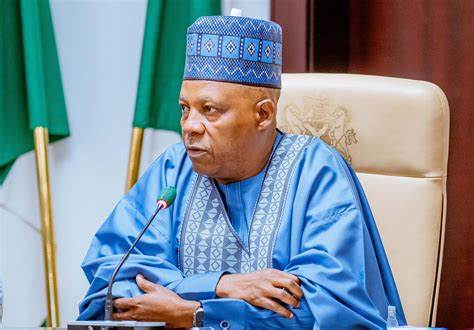Vice President Kashim Shettima has declared that the Nigerian government will not permit terrorists to undermine the nation’s peace and security, following Friday night’s deadly suicide bombing in Borno State that claimed at least 10 lives.
Speaking in a statement released on Saturday, Shettima responded to the tragic attack at a local food market in Konduga Local Government Area, where a suspected Boko Haram operative detonated an explosive device among civilians. The Vice President characterized the bombing as a “senseless and heinous act of terrorism against innocent civilians.”
The attack occurred when the bomber, disguising himself as an ordinary civilian, infiltrated the bustling fish market during peak evening hours before triggering the deadly explosion. The incident represents one of the most significant terrorist attacks in the region in recent months, highlighting ongoing security challenges in Nigeria’s northeastern states.
Shettima strongly condemned the assault while extending the government’s condolences to affected families and communities. He emphasized the administration’s commitment to supporting victims and ensuring that those responsible face justice for their actions.
“Our hearts go out to the families who have lost loved ones in this senseless act of violence,” the Vice President stated, expressing the government’s solidarity with bereaved families. “The government stands with them in this difficult time and will provide all necessary support.”
The Vice President used the occasion to reaffirm the Tinubu administration’s dedication to restoring comprehensive peace and security across Nigeria’s northeast region and throughout the country. His statement reflects the government’s recognition that sustained effort remains necessary to combat terrorism and protect civilian populations.
“The administration of His Excellency, President Bola Tinubu, remains committed to restoring lasting peace and security to the Northeast and all parts of Nigeria,” Shettima declared, outlining the government’s strategic priorities in addressing security challenges.
Shettima also issued a defiant message to terrorist groups operating in the region, warning that the government would not allow them to reverse progress made in weakening their operational capabilities. His comments suggest confidence in ongoing military operations against insurgent groups while acknowledging the persistent threat they pose.
“We will not allow our enemies to undermine the progress we have made in degrading their capabilities,” the Vice President stated, indicating that security forces would maintain pressure on terrorist organizations despite their continued ability to conduct attacks.
The Vice President’s response comes as the Nigerian government faces ongoing criticism about its handling of security challenges, particularly in the northeast where Boko Haram and other extremist groups continue to pose threats to civilian populations. The Konduga attack demonstrates the persistent vulnerability of local communities despite years of military operations.
Shettima specifically called on relevant government agencies to prioritize urgent support for victims and families affected by the bombing, indicating that the administration recognizes its responsibility to provide immediate assistance to those impacted by terrorist violence.
The timing of the Vice President’s statement reflects the government’s awareness that public confidence in security arrangements requires both decisive action against perpetrators and visible commitment to supporting affected communities. His assurance about bringing perpetrators to justice attempts to demonstrate accountability while managing public expectations about the complexity of counter-terrorism operations.
The Konduga bombing serves as a stark reminder that despite military gains against terrorist groups, the threat of violence against civilian targets persists in Nigeria’s northeast. Shettima’s response attempts to balance acknowledgment of this reality with reassurance about the government’s determination to protect citizens and pursue lasting solutions to regional security challenges.



















